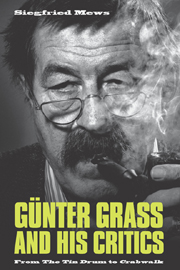Book contents
- Frontmatter
- Contents
- List of Abbreviations
- Introduction
- Part 1 Danzig, Center of the Universe
- Part 2 From Danzig to the Global Stage: Grass's Fiction of the 1970s and 1980s
- 5 Örtlich betäubt / Local Anaesthetic
- 6 Aus dem Tagebuch einer Schnecke / From the Diary of a Snail
- 7 Der Butt / The Flounder
- 8 Das Treffen in Telgte / The Meeting at Telgte
- 9 Kopfgeburten oder Die Deutschen sterben aus / Headbirths or The Germans Are Dying Out
- 10 Die Rättin / The Rat
- 11 Zunge zeigen / Show Your Tongue
- Part 3 After Reunification: Old Problems and New Beginnings
- Epilogue
- Works Cited
- Index
9 - Kopfgeburten oder Die Deutschen sterben aus / Headbirths or The Germans Are Dying Out
from Part 2 - From Danzig to the Global Stage: Grass's Fiction of the 1970s and 1980s
Published online by Cambridge University Press: 05 February 2013
- Frontmatter
- Contents
- List of Abbreviations
- Introduction
- Part 1 Danzig, Center of the Universe
- Part 2 From Danzig to the Global Stage: Grass's Fiction of the 1970s and 1980s
- 5 Örtlich betäubt / Local Anaesthetic
- 6 Aus dem Tagebuch einer Schnecke / From the Diary of a Snail
- 7 Der Butt / The Flounder
- 8 Das Treffen in Telgte / The Meeting at Telgte
- 9 Kopfgeburten oder Die Deutschen sterben aus / Headbirths or The Germans Are Dying Out
- 10 Die Rättin / The Rat
- 11 Zunge zeigen / Show Your Tongue
- Part 3 After Reunification: Old Problems and New Beginnings
- Epilogue
- Works Cited
- Index
Summary
A Contribution to the 1980 Election Campaign?
In june 1980, LESS THAN A YEAR AFTER the publication of Das Treffen in Telgte and shortly after Grass's return from his second extensive journey to Southeast and East Asia in the fall of 1979, on which he was accompanied by Ute Grunert, his second wife, Kopfgeburten (Headbirths or The Germans Are Dying Out, 1982) appeared on the book market. The weekly Die Zeit published the entire eighth chapter in May of the same year, accompanied by a laudatory introductory note by Fritz J. Raddatz (1980), one of the few major critics who fairly consistently took Grass's side and who had been defended by Grass against attacks by other critics prior to the publication of Kopfgeburten (see Mews 1983b, discussed below). Raddatz praises the narrative, which cannot be classified in traditional terms of genre, as a masterful product of the author's virtuosity. Unlike other reviewers, among whom the renowned Marcel Reich- Ranicki is conspicuously absent, Raddatz does not seem to be bothered by the lack of recognizable generic distinctions; on the contrary, he sees in the text, which is neither a film (Grass's plans to produce a film based on his travel experiences in cooperation with Volker Schlöndorff, director of the 1979 film version of Die Blechtrommel, did not materialize), a film novella, nor a novella, but a prose study full of scurrilous humor, cheerful grotesqueness and, at the same time, serious nonsense.
- Type
- Chapter
- Information
- Günter Grass and his CriticsFrom 'The Tin Drum' to 'Crabwalk', pp. 188 - 203Publisher: Boydell & BrewerPrint publication year: 2008



